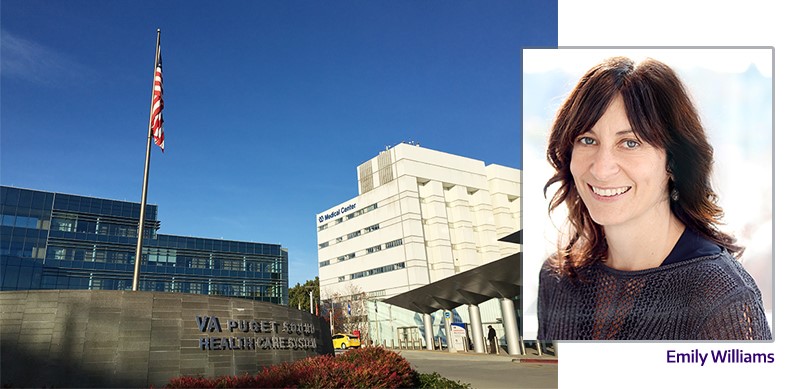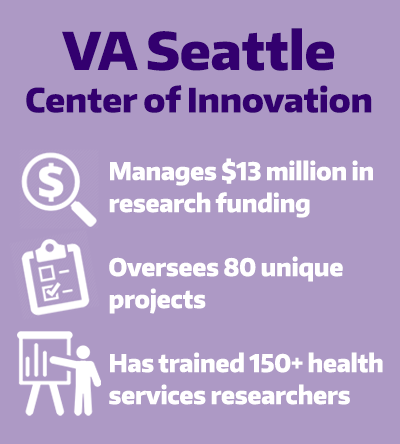
For nearly four decades, a thriving relationship between the University of Washington and the U.S. Department of Veterans Affairs (VA) Puget Sound Health Care System has incubated critical research that has improved health and health care for Veterans and their communities.
This Veterans Day, on Nov. 11, we take a deeper look at the longstanding partnership and spotlight one of the collaboration’s key researchers.
The VA Puget Sound Health Care System and UW School of Medicine initiated what is now the Seattle-Denver Center of Innovation for Veteran-Centered and Value-Driven Care in 1982. It is one of 18 national VA Centers of Innovation (COIN), funded by the VA Health Services Research & Development Service, and has dedicated partnerships across the UW, including close ties with the UW School of Public Health’s Department of Health Services.

The COIN supports 36 core and affiliate investigators; six of whom have joint faculty appointments in the Department of Health Services, and another six who have affiliate appointments. The Seattle section of the COIN oversees more than 80 unique research projects, manages over $13 million in funds from federal and non-federal sources, and has trained more than 150 health services researchers.
“The VA’s clinical and research infrastructure and broad patient population enables us to address health services and population health issues that are critical to both Veterans and the broader research and public health community,” said Emily Williams, VA core investigator, associate professor of health services at the UW School of Public Health and director of the School's PhD Program in health services.
Williams’ research is focused on increasing access to and quality and equity of evidence-based treatment for unhealthy substance use. About directing the PhD program, she said, “Being strongly footed in both institutions allows me to further the training goals of the Health Services PhD program by ensuring funding opportunities for our students, mentoring some myself, and serving as a liaison between other students and VA mentors and funding opportunities.”
With mentorship from VA faculty, 12 of the 34 currently enrolled PhD students are studying some of the most critical health issues and service innovations of our time, including opioid and alcohol use disorders, sexual trauma, de-implementation of ineffective practices, maternal and child outcomes among racial and ethnic minorities, transgender health, suicide, HIV, and community partnership models to improve chronic disease outcomes.
VA Puget Sound is one of 145 large medical centers within the Veterans Health Administration, which is the largest integrated health care system in the United States. The system treats 7 million patients annually on a $76 billion medical care budget that is dispersed across the medical centers and their 1,231 affiliated outpatient clinics. With its national electronic health record (EHR), dedicated resources for both research and clinical-research partnerships, and large and diverse patient population, the VA offers a unique learning health system setting for research focused on improving the outcomes of individuals, populations, and health care organizations.
“VA also enables joint faculty to be instrumental in training health services professionals and researchers who will carry this work forward,” Williams said. She also noted that multiple training opportunities are offered to UW students by the VA, including COIN-funded research assistantships and competitive pre-doctoral awards initiated in 2016, which have been granted to three students to date.
Williams joined the VA in 2003 as a research project director for then UW/VA joint faculty mentor Katharine Bradley, and with support, encouragement and access to VA data from Dr. Bradley, ultimately graduated from the PhD Program in health services. Williams feels she benefited substantially from this partnership and now sees herself as “paying it forward” to train the next generation. “After attending and completing the doctoral program, I was hired with a joint appointment at the VA COIN and the Department of Health Services,” said Williams, who now directs the doctoral program and serves as primary mentor for five of the 12 Health Services PhD students currently supported by VA investigators.
The COIN builds upon over 35 years of research history to conduct outstanding health services research that promotes patient-centered and value-driven care, generate and disseminate knowledge that contributes to the well-being of patients, partner with operational leaders to implement research findings into clinical care, and provide high-caliber training to the next generation of health services researchers and leaders.
